#Thyroid Hormone Replacement
Text
Patient-Centered Care in Endocrinology: Integrating Treatment with Quality of Life Considerations.
Endocrinology is a branch of medicine that deals with the endocrine system, which consists of glands that produce hormones. Hormones are chemical messengers that regulate various bodily functions, including metabolism, growth and development, sexual function, and mood. When the endocrine system malfunctions, it can lead to a wide range of health issues that may require treatment by an endocrinologist.
Endocrinologists are medical specialists who diagnose and treat hormone-related disorders. They have expertise in managing conditions such as diabetes, thyroid disorders, adrenal gland disorders, pituitary gland disorders, and reproductive disorders. Endocrinology treatment aims to restore hormonal balance and alleviate symptoms to improve the patient's quality of life.
Here are some common conditions that may require consultation with an endocrinologist:
1. Diabetes:
Endocrinologists play a crucial role in managing diabetes, a chronic condition characterized by high blood sugar levels. They help patients with type 1 diabetes, type 2 diabetes, gestational diabetes, and other forms of the disease by prescribing medication, recommending lifestyle changes, and providing education on blood sugar monitoring and insulin administration.
2. Thyroid Disorders:
The thyroid gland regulates metabolism and energy levels by producing thyroid hormones. Thyroid Disorders such as hypothyroidism (underactive thyroid) and hyperthyroidism (overactive thyroid) can disrupt this balance. Endocrinologists assess thyroid function through blood tests and imaging studies and prescribe medications or other treatments to manage thyroid disorders effectively.
3. Adrenal Gland Disorders:
The Adrenal glands produce hormones such as cortisol, aldosterone, and adrenaline, which are essential for regulating stress response, metabolism, and blood pressure. Conditions like Cushing's syndrome, Addison's disease, and adrenal tumors can affect adrenal function. Endocrinologists diagnose these disorders using hormone tests and imaging techniques and develop individualized treatment plans to restore hormonal balance.
4. Pituitary Gland Disorders:
The Pituitary Gland Disorder, often referred to as the "master gland," produces hormones that control other endocrine glands in the body. Disorders such as pituitary tumors, acromegaly, and hypopituitarism can result from pituitary dysfunction. Endocrinologists work closely with neurosurgeons and other specialists to diagnose and manage pituitary gland disorders using medication, surgery, or radiation therapy.
5. Reproductive Disorders:
Endocrinologists specialize in treating reproductive disorders that affect hormone levels and fertility in both men and women. Conditions such as polycystic ovary syndrome (PCOS), infertility, and menopause-related symptoms may require hormone therapy, assisted reproductive techniques, or other interventions to achieve desired outcomes.
In addition to these conditions, individuals experiencing symptoms such as unexplained weight changes, fatigue, irregular menstrual cycles, excessive thirst or urination, and changes in libido or sexual function should consider consulting an endocrinologist. A thorough evaluation by an endocrine specialist can help diagnose underlying hormonal imbalances and develop appropriate treatment strategies tailored to the patient's needs.
Conclusion:
In conclusion, endocrinology treatment encompasses the diagnosis and management of various hormone-related disorders affecting the endocrine system. If you're experiencing symptoms suggestive of a hormonal imbalance or have been diagnosed with a hormone-related condition, scheduling a consultation with an endocrinologist can provide valuable insights and personalized care to improve your health and well-being.
#Hormone Replacement Therapy (HRT)#Insulin Therapy#Thyroid Hormone Replacement#Antidiabetic Medications
0 notes
Text
"you wouldn't be disabled if the world was built to accommodate mobility differences!" and here I thought it was being in pain + having a chronic illness that can cause just about every symptom!
#☢️.txt#i remember someone once actually saying that i#personally. im more concerned about doing the shit i WANT to be doing in the worls that does exist#i shouldnt be upset about my chronic fatigue and should instead accept it and be upset that im not allowed to rest#and they HAD chronic fatigue. like ok great glad you feel better simply by imagining a world where you can be ill without dying#bc im never gonna get to live in a society that supports chronically ill people. and because i actually do find my life miserable!#i like to do things! i have interests! i like school! i have hobbies and friends! why the fuck is saying that my chronic illness#is primarily a medical issue wrong! why the fuck does every disabled leftist stop talking about bodily autonomy#the SECOND its a disabled person expressing a desire for medical solutions.#anyways im pro medicine. i love medicine. i think allopathic medicine is a great human success and it would be an even greater one#if we properly tackle issues of race/gender/ability and bias. and i even think its good to look for ways#to improve peoples lives and health. and sometimes those things are going to involve treating disabled ppl with the goal of curing#and i am extremely glad people DO that bc its why im able to take a pill and not have chronic fatigue (hormone replacement for thyroid)#sorry for the rant i just genuinely hate how ppl act like their experience of disability means ppl cant hate their own
1 note
·
View note
Text
Demystifying Hypothyroidism: Understanding the Symptoms, Causes, Diagnosis, Treatment, and Prevention of Underactive Thyroid
In the intricate symphony of human hormones, the thyroid gland plays a pivotal role. This small, butterfly-shaped gland, located at the base of the neck, is responsible for producing thyroid hormones, which regulate metabolism, energy levels, growth, and
In the intricate symphony of human hormones, the thyroid gland plays a pivotal role. This small, butterfly-shaped gland, located at the base of the neck, is responsible for producing thyroid hormones, which regulate metabolism, energy levels, growth, and development. When the thyroid gland doesn’t produce enough hormones, a condition known as hypothyroidism arises.
Unveiling the Symptoms of…

View On WordPress
#balanced diet#causes#diagnosis#fulfilling life#Hashimoto&039;s thyroiditis#healthy life#healthy lifestyle#hormone replacement therapy (HRT)#hypothyroidism#iodine deficiency#iodine excess#levothyroxine#medications#morningmantra#prevention#radiation therapy#regular exercise#sleep#stress management#symptoms#thyroid surgery#thyroid-stimulating hormone (TSH) test#treatment#underactive thyroid
0 notes
Text
Global Thyroid Hormone Replacement Therapy Market Size & share Forecast 2031.

Global Thyroid Hormone Replacement Therapy Market Size, Share & Trend Analysis- By Medications, By Administration, By Distribution Channel, By End User, Regional Outlook, Competitive Tactics, and Segment Forecast to 2031.
0 notes
Text
Have you had Your hormones checked lately?
What The Latest Science Tells Us
Dr. Lindsey Berkson has made a career of studying hormones. She is the author of over 21 books and teaches physicians how to assess and prescribe hormones. I attended a course she taught to over 100 doctors and was overwhelmed by the latest science related to hormones.
Dr. Berkson shared that hormone therapy can be used safely in older women. Hormones are a…

View On WordPress
#Biotics Research#chicago#Chicago Chiropractor#Chiropractor near me#Dr. Godo#Estrogen#female hormones#Hormone replacement therapy (menopause)#hormones#HRT#peri-menopause#Progesterone#testosterone#thyroid hormones
0 notes
Text
Herb Guide to HRT for Warrior Cats
Have a warrior OC you would like to show being on hormone replacement medication? I’ve gone through herbs historically associated with femininity/masculinity, as well as those with effects on sex hormones, that a wild cat could hypothetically find and use.
Of course, this would still require a bit of a leap as there’s no herb in nature that can replace our friend Spironolactone... but if you’d like some herbs with a grain of truth or history to them that wouldn’t poison a semi-realistic cat? Here you go!
(DO NOT USE THESE HERBS ON YOURSELF OR A REAL ANIMAL.)
Let’s identify what we’re looking for;
Hormone suppressing herbs = antigonadotropins
Prevents production and recognition of present hormones. This is going to be big for an agender transition; but even in a binary one, they’re often taken with-
Hormone producing herbs = estrogen/estradiol & testosterone/androgens
Make sure your warrior doesn’t start on huge amounts! Smaller, controlled doses are more effective. Too much can cause the opposite effects and slow down transition.
Historical precedent = Just Cool
If I find a cool story I’m just going to include it, but note that it doesn’t hold pharmacological basis.
I considered also including some thoughts on surgical treatments as well, but I’ve decided I’ll save that for a follow-up. This guide is purely focused on medication to stay SFW!
Hormone Suppressants
Lycopus (also known as Wolf’s Foot, Water Horehound, Bugleweed) is such a widespread species and has several other medical uses. Not only is it THE most well documented antigonadotropin I came across, but its different species have a wide variety of medical use, including treating anxiety, heart palpitations, stopping bleeding, and respiratory illness. This is also a mint that is not toxic to cats. Also it can be used as a dye.
THERE IS A CAVEAT; if Lycopus supplements suddenly stop or overdosed, it can cause thyroid enlargement. Keep this in mind if your trans warrior ever gave up their medication to a sick clanmate in leafbare!
Lithospermum ruderale (Aka western Stoneseed or Lemonweed) has similar suppression properties, but only in American fanclans, and not as many secondary uses.
Comfrey ROOT can also be used for this purpose, in addition to its canonical uses (funfact this plant is also called knitbone). But can cause liver failure in high doses.
Rosemary suppresses feminine hormones in the uterus, for warriors going from Female to Male. Additionally, it’s an excellent antifungal, smells great, and can be used as a cooking spice.
Molly to Tom (Female to Male)
Pine Pollen (particularly from the Scots Pine), can be added to water or foods and increase testosterone.
Stinging Nettle ROOT could also be taken for a transmasc warrior. The above ground plant can be processed for use with allergies, but the relevant part here is the root underground, which has no stinging hairs.
Sarsparilla ROOT is historically associated with testosterone, though modern studies haven’t held up the claims... but, it is a plant an American clan would have access to, and is also used to make root beer.
Tom to Molly (Male to Female)
FENNEL?? AGAIN??? It’s true.
Through Fennel, all things are possible
It has estrogenic properties in all sexes and has been explored for the creation of synthetic estrogen since the 1930s. This can be used for a transgender warrior, as well as for a cisgender queen with a hormone issue. It must be remarked though; it looks alarmingly similar to poison hemlock, and should not be collected by untrained cats.
Hops (Humulus lupulus) is up next, but first I think this education is worthwhile; phytoestrogens aren’t exactly like true estrogens, but in high enough quantities (as in, much, much more than a plate of soybeans or a mug of beer) they can have estrogen-like affects.
Hops are the uncontested queen of these, and they grow wild in several continents. Hops can sometimes be toxic to cats, based on a genetic predisposition, and mostly to the ‘cone’ (female flower). For the best hormonal effect, the ‘flower‘ (male flower) would be dried and eaten.
Flax flowers don’t contain nearly as much phytoestrogen, but are safer for cats. Additionally, flax is extremely useful in construction, and can be used to make fabric or twine if your Clan is advanced enough.
#I don't have a DNI so here's the warning; If I see TERFs clowning on his post I will block on sight.#Trans rights#I'm as queer as a rainbow steer#transgender#Clan Herbs#Clan Culture#Warrior Cats#Fennelposting#I have no idea how Fennel ends up on every single one of these lists somehow#In love with Bugleweed btw#God it has SO many uses#Most of this was sourced from The Review Of Natural Products#The fifth edition specifically because that was the one I could find#The newest one is going for like 200$ jesus christ
1K notes
·
View notes
Text
For fun, I wanted to think through which organs Darth Maul is actually missing. This gives us clues as to which bodily processes he just doesn't have anymore, which ones he's using sith juju to make up for, and what Talzin or Death Watch might've done for him with the prosthetics. To be fair, humans have about 70 to 80 possible organs systems (don't ask), but who knows what zabrak have, and where they truly are located. We can only guess.
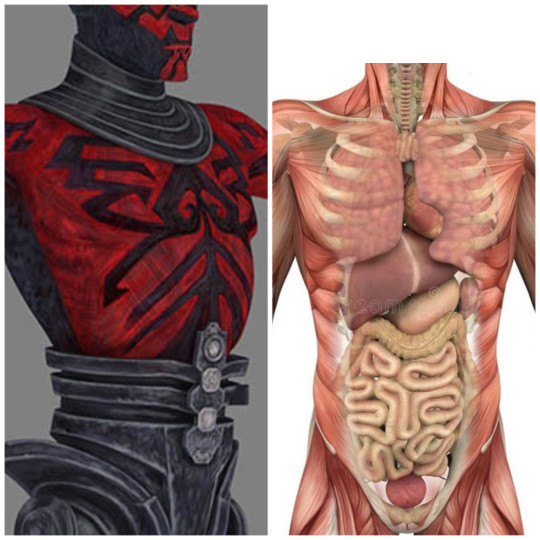
✓ Means he probably has this.
X Means he probably doesn't have this.
O Means he probably only has some.
(Checklist and conclusions below the cut.)
✓ Adrenal glands (above the kidneys)
X Anus
X Appendix
X Bladder
O Bones
O Bone marrow (spongy part of the bone)
✓ Brain
✓ Bronchi (tubes in the lungs)
✓ Diaphragm (muscle of breathing)
✓ Ears
✓ Esophagus
✓ Eyes
✓ Gallbladder
X Genitals
✓ Heart ( 2 of them!)
✓ Hypothalamus (in the brain)
O Joints
✓ Kidneys
O Large intestine
✓ Larynx (voice box)
✓ Liver
✓ Lungs
O Lymph nodes
O Mesentery (Nerves, vessel, & fat storage in gut)
✓ Mouth
✓ Nasal cavity
✓ Nose
✓ Pancreas (hormones/enzymes)
✓ Pineal gland (in the brain- hormone production)
✓ Parathyroid glands (hormones, in the neck)
✓ Pharynx (back of the throat)
✓ Pituitary gland (in the brain, hormones)
X Prostate
X Rectum
✓ Salivary glands
O Skeletal muscles
O Skin
O Small intestine
O Spinal cord
✓ Spleen (big blood filter)
✓ Stomach
✓ Teeth
✓ Thymus gland (immune training, in the chest)
✓ Thyroid (hormones, in the neck)
✓ Trachea
✓ Tongue
O Ureters (Kidney to bladder tubes)
X Urethra
O Ligaments (connect muscles to bones)
O Tendons (connect bones to bones)
✓ Blood cells
✓ Hair (Uhhh... horns? I guess he has eyelashes?)
✓ The vestibular system (of the ear)
X Testes (unless zabrak locate them internally)
✓ Nails
X Vas deferens (testes to genitals tube)
X Seminal vesicles (semen fluid production)
X Bulbourethral glands (makes preejaculate)
X Penis
X Scrotum (if zabrak keep the testes externally)
✓ Parathyroid glands (neck, hormonal)
O Thoracic ducts (Where lymph flows into veins)
O Arteries
O Veins
O Capillaries
O Lymphatic vessels
✓ Tonsils
O Nerves
O Subcutaneous tissue
O Olfactory epithelium (nose)
✓ Cerebellum
Long story short, besides just his legs and genitals, Maul lost most of his digestive and urinary systems.
He actually kept almost all of his life-critical organs, so whatever sith voodoo he was doing to stay alive on Lotho Minor was probably focused on fighting off sepsis (due to the unclean end points of his digestive system. Remember he got cauterized by a lightsaber so assume he had to make... new holes. There may have also been some self-done surgery to reconnect what remained of his large and small intestines.)
The loss of his testes, if he indeed had human typical location for them, could have proven a growing problem, considering that they make 90% of a man's testosterone, and that's needed just to have normal amounts of energy.
The digestive track is also a problem, as the gut microbiome is where a lot of neurochemicals are produced. For example, 95%~ of the body's seratonin is produced in the gut. Lacking huge chunks of his small and large intestine means that Maul had poor absorbtion of nutrients, and probably needed to eat all the time just to get a fraction of the calories and nutrients from his food.
So. He lived on the edge of starvation due to a truncated digestive track, had low energy, mood imbalances like you wouldn't believe, and constant sepsis. I'm sure the acid rain being the only source of fresh water was also just, so helpful.
I assume, by the lack of black veins on him afterward, and (sort of?) stable mood, that talzin might've regrown some of his gut and fixed the end point issues. Later on, Death Watch (being mandalorians) might've given him more robust life support systems that included testosterone replacement and cybernetic genitals. Seems like what they would do for their own people.
Possible lingering complications? I assume he has a VERY weird relationship with food. He had spider legs for twelve years, so bipedal motion probably fails him sometimes. Back pain. Phantom leg pain. Nerve junction issues. Immune system weirdness (from all that missing marrow, and a long stint with sepsis). Issues storing fat. Talzin yoloed his brain back to sane-adjacent, so mental health is... I mean. Yeah. Triggers. Teeth prone to chipping and cavities (from malnutrition and acid water). Possibly goes to the bathroom once a day and urinates like a race horse. Issues with being touched, myriad phobias, and a squirrelly libido.
Did I miss anything?
#darth maul#star wars#maul opress#nightbrothers#zabrak#sith#lotho minor#writing resources#fanon#medical#xenobiology#sci-fi healthcare
240 notes
·
View notes
Note
Hiiii I’m glad you’re posting again 💕 I’m curious to know what things you do to get energy naturally. I know coffee and energy drinks are so bad for me. I also hate when I eat a meal and I feel tired after. It’s hard to balance trying to gain weight and not feeling fatigued after eating a larger meal. Any tips for what I can add to my diet and/or lifestyle to feel more energized?
Hi! 💞
I have noticed that starches do that to me, so I try to limit my consumption of them. When I eat too much I get a bit lethargic.
Try upping your protein intake and replacing the starches with vegetables or simple carbs such as fruits. Don’t completely take them out of your diet, but play around and see what your body likes best.
Ive also noted that cutting out gluten significantly improved my energy levels / well being in general.
Some other tips :
- Drink coconut water (rich in electrolytes) / mineral rich beverages : too much plain water can deplete your minerals
- Check to see if you’re not vitamin D deficient, this can cause lethargy and a bunch of other annoying symptoms lol
- Low impact workouts over high intensity and cardio, especially if you have hormonal imbalances or thyroid issues. Ive seen people lose more weight / get toned easily doing that versus the usual « hard » workouts
- Block out curtains or use a sleeping mask, even the slightest bit of light at night can alter your quality of sleep, which will in turn affect your energy levels during the day
I’ll add more if I remember ! Hope it helped 🫶🏽
39 notes
·
View notes
Text

I've been really ill the last couple of weeks. Turns out to be due to the medication that replaces the thyroid hormones, now that I am minus that thing, was all out of whack. So I had to go in for more testing/ultrasound/medication changes.
I'll be doing follow ups every few weeks for a while, at least a couple of years. This is mostly to monitor my thyroid levels. Because guess what? Even though the thyroid is gone, there may be tiny thyroid "fibers" that still remain, and unless my levels are tightly controlled, the cancer could come back. Hence the constant monitoring.
All this has cut into money for bills. I'm late on my rent and just don't have it to pay. I barely made my car payment, and it was late. I got stuck with a $200 electric bill even though I live in a tiny one-bedroom apartment. It's all just gotten real bad in a hurry.
I feel like I've been perpetually in the rock and the hard place, only it's medical bills and just regular bills, and they're both doing their best to crush me. So I need to push this all over the web as far as it will go. I'm still not close to my goal, and at this rate, I may have to push that goal out a little farther to get to where I need to be.
And right now that's really hard to even get up some days. Since my levels went wild, I've been unable to eat much, and when I have, I get sick. Or like with that nice bowl of soup I made a couple weeks ago my body decides to be sick before I even get a chance to eat it. Then there's the fatigue, brain fog, GI issues, my mental health just falling apart, and the inability to stay warm. I'm sitting here with two sweatshirts on and a space heater running next to me. It's 72 in here and in the 50's outside. I'm still shivering. So in case you're wondering how bad a thyroid can mess you up, it's BAD.
Not to mention, I've been trying to work a full time job while all this is happening, and it's been absolutely miserable. I go home at the end of the day and just collapse. So I'm asking to please make a donation if you can, and also share this around as much as possible. Donations have been pretty thin on the ground as of late, and it's been the only thing that was keeping my head above water. Please.
28 notes
·
View notes
Text
Misaki’s Cancer: CW for mentions of cancer, scars, and treatments - BD E10 SPOILERS!
I wanted to look a bit more into Misaki’s cancer. I am not an expert on this topic at all, just going off of info I find online, so anyone who is more informed, please feel free to add your thoughts, more info, etc.

The only thing we really have to go off of in regards to it is the scar, which looks similar to a scar after thyroid cancer removal:

Most of the thyroid cancer scars you find online are post-two weeks, so I’m going to assume that is the same for Misaki’s scar or, at the very least, that that is the youngest the scar is. She could have had the surgery a bit further back as well. How prominent/dark and how faded a scar looks can also very a lot from person to person for a variety of reasons.

We also have Misaki saying, “The cancer spread to here.” Now, I’m not sure if this means that she has had cancer in other parts of her body, and has had it removed, and then it has spread up to her throat, or if this is talking more about how some types of thyroid cancer can spread to other tissues in the throat, such as the lymph nodes.
When Rei asks Misaki if she is going to die, she doesn’t give a direct answer, instead saying:
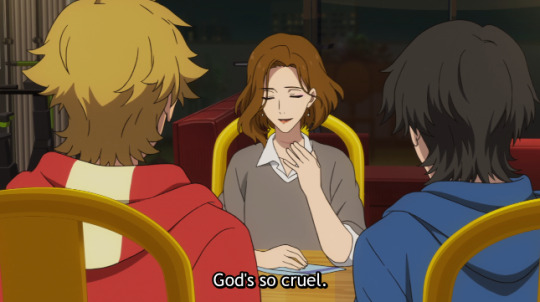
“God’s so cruel.” And:
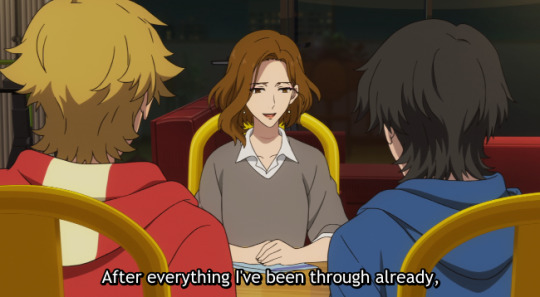
“After everything I’ve been through already,”

“he throws this on the pile.”
To me, that isn’t her confirming a death sentence, but more so just implying that her life has gotten more complicated and the cancer caused a lot of general upheaval in her life that wasn’t present before (though before there were a lot of other issues as well, but that’s a different story).
After all, even though she has had the thyroid cancer removed, there are still other things she would have to worry about. Such as:
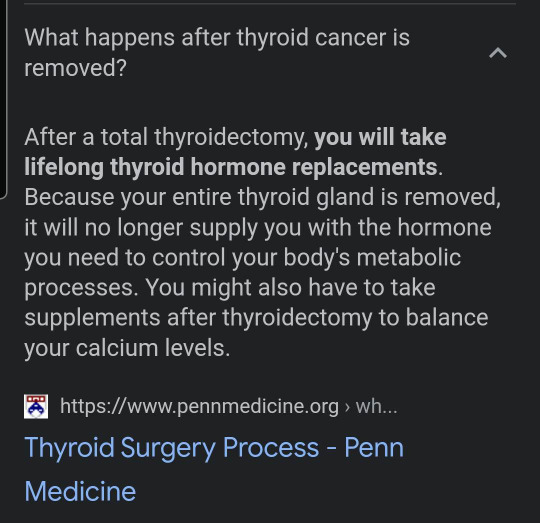
“taking lifelong thyroid hormone replacements,” possibly “supplements to balance your calcium levels,” and other treatments to ensure that the cancer has not returned or spread elsewhere.
When looking into thyroid cancer, however, it seems that this cancer isn’t generally a super fatal one, especially for Misaki’s age:

70% of all thyroid cancer deaths occur in patients who are 65 years and older, with an average age of 73 years. Most forms of thyroid cancer aren’t fatal as well:
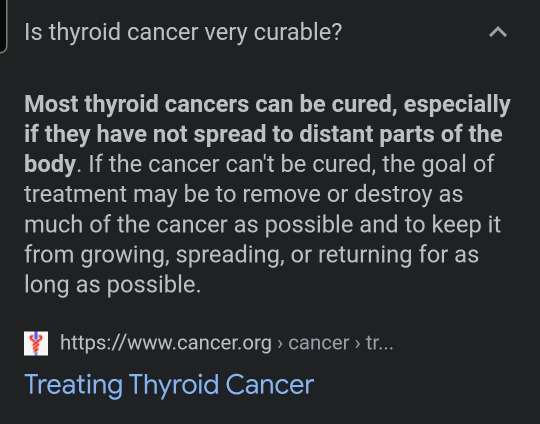
As the text in the image above notes: Most thyroid cancers can be cured, especially if they have not spread to distant parts of the body. If the cancer can’t be cured, the goal of treatment may be to remove or destroy as much of the cancer as possible and to keep it from growing, spreading, or returning for as long as possible.
The survival rate is also quite high:

Text: “In the United States, the 5-year survival rate for people with thyroid cancer is 98%. However, survival rates are based on many factors, including the specific type of thyroid cancer and stage of the disease.
Of course, the above information is United States based. Japan’s thyroid cancer survival and death rate are a bit different (survival is lower and death rates higher), though this may be due to having a larger elderly demographic (as noted above, with most deaths occurring in those 65 years and over).
Now, based on what Misaki said, we know that there has been “spreading.” But does that mean that the cancer spread into the thyroids or does that mean that cancer from elsewhere spread into her thyroid? If it’s the former, then her survival rate is still rather high:

It would be Stage 2 Regional Cancer which, according to this graphic above, has a 97.6% survival rate. Though, it should be noted that she may have anaplastic thyroid cancer, which is a very aggressive form of thyroid cancer and often results in death (and not much time to live afterwards).
Also, if the cancer’s source isn’t the thyroids and it spread there from somewhere else, then that means she has Stage 3 Cancer, can vary or range depending on the kind, but is generally a lot lower.
We still don’t have a 100% clear picture on this aspect, but Misaki’s cancer isn’t necessarily a death sentence. It might have just been a very painful and life altering wake-up call. Hopefully that life-altering wake-up call will ultimately be a good one and that she will end up with a good survival rate. But, I’m not going to rule out more aggressive types, other cancers, and so forth, which may lower her overall survival rate/length of time as well.
Especially since I’m not a doctor or nurse or anyone with actual medical knowledge and experience with cancers (outside of family members who have had cancer, some of whom are still very much alive). So, once again, if you have more knowledge in this area, please feel free to add to this!
#Buddy Daddies#BD#Misaki Unasaka#cancer mention#cancer tw#BD spoilers#Buddy Daddies spoilers#long post#image heavy post
107 notes
·
View notes
Text
today in "canada has a functioning healthcare system" my mother is having her medication (that she has been on for twenty years to replaces her thyroid hormone after her having her thyroid removed because of cancer) withheld by her doctor, who did not inform her that her hormone levels were off in november and is now refusing to refill the rx until my mother gets a physical, which she can't get an appointment for until over a month from now, and was told she's "wasting taxpayer's money" by said doctor when she asked for another blood test to check said levels. <3
#americans who think canada's healthcare system is soooooo great. whats that like#i am so serious i need to move so i can take my mother to another country i am so scared one or both of us is going to get recced for maid
7 notes
·
View notes
Text
Worst Organ Bracket Round One - Thyroid VS Wisdom Tooth
If you'd like to read ALL submitted propaganda in full, you can find a link on the main blog tagged #pollpropaganda.
The THYROID is an endocrine gland located within the neck, beneath the Adam's apple. Its function is to release three hormones; two of which mediate metabolism and growth, and one of which maintains calcium balance.
Prominent diseases of the thyroid include hyper/hypothyroidism, and goitre.
Propaganda:
"Mine doesn't work well and I've been on medication to supplement it since I was 12. But hey, at least this is better than it working TOO well where the solution is to surgically remove it and then go on this same medication to fully replace it."
The WISDOM TOOTH is a type of tooth located at the back of the mouth, behind the molars. They are used to grind food. Or at least, that's where they're supposed to be, and what they're supposed to do.
The primary problem with regards to wisdom teeth is their tendency to erupt out of place (see below), which results in them impacting/crushing other teeth or emerging in unusual/painful places.
Propaganda:
"They dont always fit right and have to be pulled"
15 notes
·
View notes
Text
Scary body fact that no one ever mentions is that you can live without your thyroid. Like you can literally remove a part of it or all of it and you'll be fine if you take meds. But it's weird because it's like almost a second brain, it controls your metabolism, it controls your heart, muscles, it plays a major part in your development, it controls how much you sleep, how is your libido doing and even your menstrual cycle. If you have some issues with it, it can either give you symptoms like depression, hair loss, weight gain, weight loss, insomnia, anxiety, cold intolerance, heat intolerance and a lot more. Your body can literally start attacking it, it's kind of like the case where your body finds out about your eyes, it can damage it. But why it's fine if you remove it? Because we can replace the hormone it produces with pills. Yeah you need to take pills for the rest of your lives, but you can just live with them all fine. (I'm the example)
11 notes
·
View notes
Text
February is Turner Syndrome Awareness Month!
So, I rarely talk about this on here, but February definitely feels like the right time to do it. I was born with a condition called Turner Syndrome (TS), and since February is both my birth month and Turner Syndrome Awareness Month, I thought it would be a good time to spread some information about this condition that a lot of people don’t know much about!
Turner Syndrome is a condition where a person is born with only a single X chromosome in each cell, and the second sex chromosome partially or completely missing.
There is also a “mosaic” form where the second sex chromosome is only missing in some cells. TS can take a lot of different forms!
It’s more common than you might think! Approximately 1 in 2500 AFAB individuals in the US have TS according to Cleveland Clinic.
One common symptom is short stature (which is why TS Awareness Month is the shortest month!)
Heart issues are more common in people with TS than in the general population, as are thyroid and kidney problems. There is also an increased risk of scoliosis, osteoporosis, nearsightedness or farsightedness, and hearing loss.
TS can affect cognitive function as well, especially in the areas of executive function, attention, and social skills. It’s not uncommon for people with TS to also be diagnosed with ADHD or autism.
Kind of a funny note on the social skills thing: my experience has been that in social situations people with TS are usually kinda quiet, but if you get a bunch of us together we WILL NOT STOP TALKING.
You often see a LOT of different symptoms of TS listed, but the reality is that it presents differently for pretty much everyone, so it’s important for people with TS and their doctors to know their own personal concerns.
While most people with TS that I know (myself included) identify as female, there are people with TS all across the gender spectrum!
That being said, you may see TS referred to as a “female condition” in a lot of places, including medical sources. Just keep in mind that a lot of people no longer consider that to be universally true, and there has definitely been pushback against that language in recent years.
TS is typically diagnosed either at birth with genetic testing or at the normal age of puberty due to a lack of typical physical development.
Treatments often include growth hormone replacement during childhood and other hormone replacement therapies later in life. Care is usually managed by an endocrinologist, and most people will be followed by a cardiologist as well.
Butterflies are used as symbol for TS! The idea of going through hardship and coming out stronger (like a caterpillar becoming a butterfly) is something that resonates with a lot of people with TS. I actually have a butterfly tattoo!
If you want to learn more…
Here’s the Cleveland Clinic’s page on Turner Syndrome
And here’s Mayo Clinic’s
Here’s the homepage of the Turner Syndrome Society of the US! They have a lot of good information, although their website is a little confusing and probably needs updating.
If you’re on Facebook, here’s a post with some general information from the TSSUS page you can read and share!
These are definitely not the only sources out there, so feel free to do your own research.
Since I live in the US, I’m not really familiar with resources in other countries, but if anyone knows of some non-US based sources feel free to add them in a reblog!
#turner syndrome#turner syndrome awareness month#terfs dni#transphobes dni#didn’t think I’d have to add those tags but here we are
12 notes
·
View notes
Text
Hypothyroidism in Dogs: Symptoms, Causes and Treatment

When a dog’s thyroid gland does not produce enough hormones, a condition called hypothyroidism occurs. Middle-aged and older dogs are most commonly affected. Thyroid hormones help regulate many internal functions, such as metabolism and heart rate. When these hormones are low, vital functions are impaired and symptoms develop. Fortunately, with early detection and treatment, most hypothyroid dogs have a normal life expectancy.
Causes of hypothyroidism in dogs
Lymphocytic thyroiditis, an immune-mediated condition, is the most common cause of hypothyroidism in dogs. It occurs when the immune system attacks and destroys the thyroid gland, resulting in significant inflammation and low hormone production. It is unknown why the immune system decides to attack the thyroid gland, but it is thought to be hereditary.
Hypothyroidism in dogs can also occur due to thyroid gland atrophy. During this process, the functional tissue of the thyroid gland is replaced by fat. Veterinarians also don’t know why this process occurs.
A pituitary gland tumor is another cause, but it is extremely rare. The pituitary gland is located at the base of a dog’s brain and is responsible for secreting thyroid stimulating hormone. In dogs with a pituitary tumor, this process is impaired, and the thyroid gland is not stimulated. Therefore, thyroid hormones are not produced.

Symptoms of hypothyroidism in dogs
Hypothyroidism causes numerous symptoms in dogs, which may include the following:
Weight gain despite a normal appetite
Fat accumulation around shoulders, neck, and hind end
Lethargy
Dull hair coat
Slow hair regrowth
Flaky and/or thickened skin
Patches of alopecia (hair loss)
Slow heart rate
Cold intolerance
Recurrent skin and ear infections
Fertility issues
Reduced tear production (dry eye)
Nerve abnormalities
Dogs with hypothyroidism may have high cholesterol, high fat content and mild anemia on bloodwork.
How to treat hypothyroidism in dogs
Dogs with hypothyroidism require oral supplementation of a synthetic thyroid hormone called levothyroxine. This medication is given daily and is relatively inexpensive. The dose, which is determined by the dog’s weight, may change over time based on his response to treatment. Periodic bloodwork helps the veterinarian assess hormone levels and adjust the dose when necessary. Supplementation is required for the remainder of the pet’s life.
Since hypothyroid dogs are already prone to high cholesterol, switching to a low-fat kibble is beneficial. Omega-3 fatty acids also promote a healthier skin and coat. Your veterinarian can recommend the best type of food to meet your dog’s specific needs.
Life expectancy
Hypothyroidism is not a curable condition. However, most healthy, hypothyroid dogs live long, happy lives with the proper monitoring and treatment. Dogs with additional health issues, such as heart disease or kidney disease, may have shorter lifespans due to the difficulty in managing hypothyroidism alongside concurrent illness.
If left untreated, hypothyroidism results in a poor quality of life, an increased risk of complications and a reduced lifespan. Early diagnosis ensures your pet receives the treatment he needs to be happy and healthy. If you notice any signs of hypothyroidism in your dog, bring him to the veterinarian for evaluation.
#hyperthyroidism#dog health#dog thyroid health#hyperthyroidism in dogs#Dog Hypothyroidism#dog thyroids
8 notes
·
View notes
Text
Battle lines and very small amounts of chemicals
It was on Monday that I realized I am unexpectedly on the front lines of the war against trans people.
How could this happen? I'm not trans. I don't even really identify as "queer". I am, on paper, completely acceptable to the rightwing authoritarians; I'd just need to put on a red ballcap and mouth "Jesus" a few times to get them to think I'm one of them.
Now, don't get me wrong - I certainly try to be an ally. Was strongly in favor of gay marriage when that question came up, and I'm in favor of healthcare for everyone, thanks. Which very explicitly includes trans people. But, well, I didn't think I personally was anything like being targeted. Yet I am. And how can this happen?
Well, on Monday I went to see a massage therapist, to hopefully get some help for elbow pain. I went to a place nearby that a neighbor recommended - decent sized place, plenty of LMTs, associated with a larger company. As a new patient, I gave them a fair bit of medical information: mostly just the usual ass-covering. Do I have a history of heart disease? Epilepsy? Do I realize that someone will in fact touch my body? &c.
One of the questions - and, again, I don't believe this was in any way meant to be discriminatory, just a broad liability question - was whether I am taking HRT.
And it clicked that, yes, I am taking hormone replacement. Very literally, I am. Just not what they were asking about.
I take levothyroxine. It's a synthetic hormone, most often called synthroid. It's used to treat hypothyroidism: when your thyroid is not producing enough hormone to regulate your metabolism properly. It's a pretty common drug; once I started it I found out that my brother and mother-in-law are both on it. I know it was a big deal for some people, but it's had no real effect on my life: every couple of months I go in and my doctor and I look at my labs and see whether my TSH numbers have gone down and T4 has gone up, and we adjust the dose accordingly. It's the first time since college that I've looked at anything in micrograms, though.
Aside from that the big effects have been that the pharmacy has trouble keeping track of the different prescriptions - their system shows the prescription for 125 mcg and 137mcg both as "Levothyroxi...." so that's fun. And I have to take it an hour before eating in the morning, which is inconvenient and the "solutions" to that always seem to assume my big problem is the 30 seconds between waking up taking the pill and not the 3600 seconds after that. But I digress.
The point is, I am very literally taking a hormone replacement. As part of an ongoing therapy. Hormone Replacement Therapy. That's what it is.
Every pseudo-concern that anti-trans people lob at the idea of HRT and gender-affirming care would actually apply to levothyroxine, too. There is only a finite amount of data on it (true of every drug, but hey, they want it to sound scary). There are risks. There are side effects. And, yes, I could probably stop taking it and not die.
Typically they avoid this - so far - by being nakedly bigoted, by banning it for specific people. Which is pretty obviously and wildly prejudiced. We wouldn't accept "Jewish people are not allowed to drive on Saturday" or "Black people can't buy sunscreen", but "Trans people can't get hormone replacement" is being allowed to slide past.
But mark me, the people pushing these things do not care. They will get stopped on their banning colored people from the drinking fountain. And they have no compunctions on tearing down the drinking fountain and closing the public swimming pools. They will absolutely try to ban an entire class of medication just because someone they have never met might have a slightly better life from it.
And if you imagine it won't affect you... I'm sorry, you're wrong. It can and will. You might not even connect it at the time, but you'll have a condition that's treatable with hormones, except you can't get them. Your mother will be unable to join you on a vacation because she's always tired now. Something. And that's the world these people want: one that's dragged down to the level of their bigotry, because they cannot abide even the chance that the people they hate might experience anything good.
5 notes
·
View notes